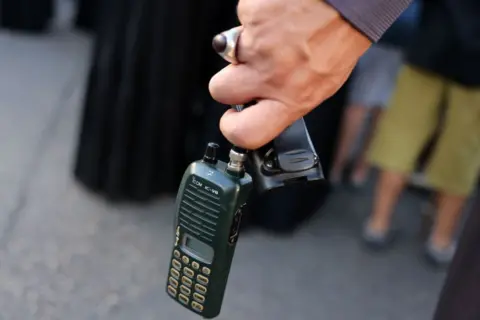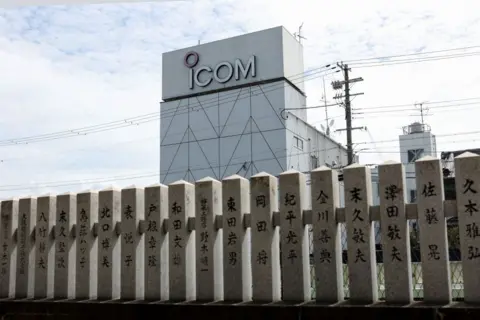 Good pictures
Good picturesA Japanese portable radio manufacturer is moving away from walkie-talkies emblazoned with its logo that exploded in Lebanon, saying it stopped production of the devices a decade ago.
At least 20 people were killed and 450 injured when hundreds of walkie-talkies used by the armed group Hezbollah exploded across Lebanon on Wednesday.
According to photos and video of the aftermath of the attack, the devices appear to be IC-V82 transceivers made by Osaka-based telecommunications manufacturer Icom.
But Icom says it hasn’t manufactured or exported IC-V82s or the batteries needed to power them for 10 years.
It is the second Asian company to be hit by bombings in Lebanon this week after thousands of pagers went off. It appears to be related to Taiwanese company Gold Apollo At least 12 people were killed and more than 2,000 were injured.
Gold Apollo’s founder Hsu Ching-kwang flatly denied his company had anything to do with the attacks, saying it had licensed its trademark to PAC Consulting, a company in Hungary that could not be contacted by the BBC.
Icom told the BBC it was aware of reports that two-way radios bearing its logo had exploded in Lebanon and was investigating.
“The IC-V82 is a portable radio manufactured and exported from 2004 to October 2014, including the Middle East. It was discontinued about 10 years ago, and since then, it has not been shipped from our company,” Icom said in a statement.
“Production of the batteries needed to power the main unit has also been discontinued, and the hologram seal to distinguish fake products is not attached, so we cannot confirm that the product was shipped from our company.”
Icom said that all of its radios are manufactured in a single factory in Japan and that it only sells products to overseas markets through authorized distributors.
Earlier, a sales executive at Icom’s U.S. subsidiary told The Associated Press that the radio devices that exploded in Lebanon appeared to be knock-off products not manufactured by the company — adding that it was easy to find fake versions online.
The device is favored by amateur radio operators and used in social or emergency communications, including people tracking tornadoes or hurricanes, he said.
It took the BBC seconds to find the Icom IC-V82s listed for sale on online marketplaces.
It is unclear at what point in the supply chain these devices were compromised and how. It is also not clear whether some of them are old Icom IC-V82s or fakes as Mr Novak claimed.
 Good pictures
Good picturesLebanon’s Annahar newspaper said on Wednesday that the icom walkie-talkies were old handsets.
According to a security source who spoke to Reuters, the blasted walkie-talkies were reportedly bought by Hezbollah five months ago.
Icom manufactures walkie-talkies and radio equipment for marine, aviation and land users, and considers itself a “world leader in the amateur radio market,” according to its website.
Asia is considered a telecommunications and electronics hub, with countries such as Japan, Taiwan and China home to major technology manufacturers that are often favored as benchmarks of quality.
BBC Verify investigated BAC Consulting, the firm linked to the pagers linked to Tuesday’s blasts, and found that the firm was a shareholder and registered to a building in the 14th district of the Hungarian capital, Budapest.
PAC, 13 other companies and one person are registered in the same building. However, a search of BBC Verify’s financial information database did not reveal that the PAC had any links with other companies or individuals.
Its CEO Cristiana Bársony-Arcidiacono said she had no knowledge of the explosions. “I don’t make pagers. I’m the intermediary. I think you’ve got it wrong,” he told NBC.
